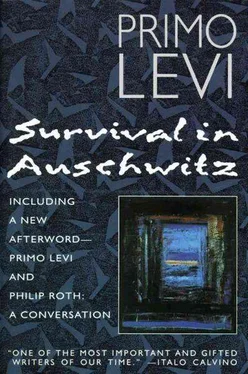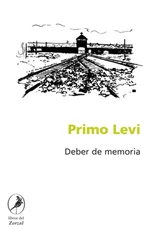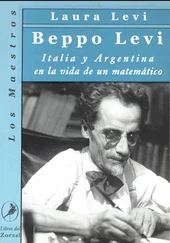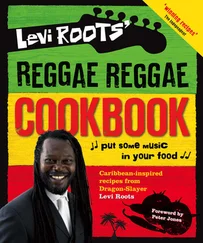At Auschwitz I quite often observed a curious phenomenon. The need for lavoro ben fatto —”work properly done”—is so strong as to induce people to perform even slavish chores “properly.” The Italian bricklayer who saved my life by bringing me food on the sly for six months, hated Germans, their food, their language, their war; but when they set him to erect walls, he built them straight and solid, not out of obedience but out of professional dignity.
Roth: Survival in Auschwitz concludes with a chapter entitled “The Story of Ten Days,” in which you describe, in diary form, how yOu endured from 18 January to 27 January 1945 among a small remnant of sick and dying patients in the camp’s makeshift infirmary after the Nazis had fled westward with some twenty thousand “healthy” prisoners. What’s recounted there reads to me like the story of Robinson Crusoe in Hell, with you, Primo Levi, as Crusoe, wrenching what you need to live from the chaotic residue of a ruthlessly evil island. What struck me there, as throughout the book, was the extent to which thinking contributed to your survival, the thinking of a practical, humane scientific mind. Yours doesn’t seem to me a survival that was determined by either brute biological strength or incredible luck. It was rooted, rather, in your professional character: the man of precision, the controller of experiments who seeks the principle of order, confronted with the evil inversion of everything he values. Granted you were a numbered part in an infernal machine, but a numbered part with a systematic mind that has always to understand. At Auschwitz you tell yourself, “I think too much” to resist: “I am too civilized.” But to me the civilized man who thinks too much is inseparable from the survivor. The scientist and the survivor are one.
Levi: Exactly—you hit the bull’s eye. In those memorable ten days, I truly did feel like Robinson Crusoe, but with one important difference. Crusoe set to work for his individual survival, whereas I and my two French companions were consciously and happily willing to work at last for a just and human goal, to save the lives of our sick comrades.
As for survival, this is a question that I put to myself many times and that many have put to me. I insist there was no general rule, except entering the camp in good health and knowing German. Barring this, luck dominated. I have seen the survival of shrewd people and silly people, the brave and the cowardly, “thinkers” and madmen. In my case, luck played an essential role on at least two occasions: in leading me to meet the Italian bricklayer and in my getting sick only once, but at the right moment.
And yet what you say, that for me thinking and observing were survival factors, is true, although in my opinion sheer luck prevailed. I remember having lived my Auschwitz year in a condition of exceptional spiritedness. I don’t know if this depended on my professional background, or an unsuspected stamina, or on a sound instinct. I never stopped recording the world and people around me, so much that I still have an unbelievably detailed image of them. I had an intense wish to understand, I was constantly pervaded by a curiosity that somebody afterward did, in fact, deem nothing less than cynical: the curiosity of the naturalist who finds himself transplanted into an environment that is monstrous but new, monstrously new.
I agree with your observation that my phrase “I think too much.… I am too civilized” is inconsistent with this other frame of mind. Please grant me the right to inconsistency: in the camp our state of mind was unstable, it oscillated from hour to hour between hope and despair. The coherence I think one notes in my books is an artifact, a rationalization a posteriori.
Roth: Survival in Auschwitz was originally published in English as If This Is a Man, a faithful rendering of your Italian title, Se questo è un uomo (and the title that your first American publishers should have had the good sense to preserve). The description and analysis of your atrocious memories of the Germans’ “gigantic biological and social experiment” is governed, very precisely, by a quantitative concern for the ways in which a man can be transformed or broken down and, like a substance decomposing in a chemical reaction, lose his characteristic properties. If This Is a Man reads like the memoir of a theoretician of moral biochemistry who has himself been forcibly enlisted as the specimen organism to undergo laboratory experimentation of the most sinister kind. The creature caught in the laboratory of the mad scientist is himself the very epitome of the rational scientist.
In The Monkeys Wrench —which might accurately have been titled This Is a Man —you tell Faussone, your blue-collar Scheherazade, that “being a chemist in the world’s eyes, and feeling… a writer’s blood in my veins” you consequently have “two souls in my body, and that’s too many.” I’d say there’s one soul, enviably capacious and seamless; I’d say that not only are the survivor and the scientist inseparable but so are the writer and the scientist.
Levi: Rather than a question, this is a diagnosis, which I accept with thanks. I lived my camp life as rationally as I could, and I wrote If This Is a Man struggling to explain to others, and to myself, the events I had been involved in, but with no definite literary intention. My model (or, if you prefer, my style) was that of the “weekly report” commonly used in factories: it must be precise, concise, and written in a language comprehensible to everybody in the industrial hierarchy. And certainly not written in scientific jargon. By the way, I am not a scientist, nor have I ever been. I did want to become one, but war and the camp prevented me. I had to limit myself to being a technician throughout my professional life.
I agree with you about there being only “one soul… and seamless,” and once more I feel grateful to you. My statement that “two souls… is too many” is half a joke, but half-hints at serious things. I worked in a factory for almost thirty years, and I must admit that there is no incompatibility between being a chemist and being a writer: in fact, there is a mutual reinforcement. But factory life, and particularly factory managing, involves many other matters, far from chemistry: hiring and firing workers; quarreling with the boss, customers, and suppliers; coping with accidents; being called to the telephone, even at night or when at a party; dealing with bureaucracy; and many more soul-destroying tasks. This whole trade is brutally incompatible with writing, which requires a fair amount of peace of mind. Consequently I felt hugely relieved when I reached retirement age and could resign, and so renounce my soul number one.
Roth: Your sequel to If This Is a Man (The Reawakening; also unfortunately retitled by one of your early American publishers) was called in Italian La tregua, “the truce.” It’s about your journey from Auschwitz back to Italy. There is a legendary dimension to that tortuous journey, especially to the story of your long gestation period in the Soviet Union, waiting to be repatriated. What’s surprising about The Truce, which might understandably have been marked by a mood of mourning and inconsolable despair, is its exuberance. Your reconciliation with life takes place in a world that sometimes seemed to you like the primeval Chaos. Yet you are so tremendously engaged by everyone, so highly entertained as well as instructed, that I wondered if, despite the hunger and the cold and the fears, even despite the memories, you’ve ever really had a better time than during those months youcall “a parenthesis of unlimited availability, a providential but unrepeatable gift of fate.”
Читать дальше












